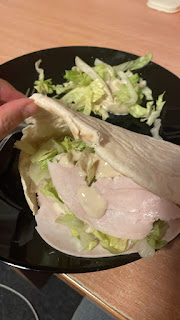Greetings all, my name is Nasha and I am a first year student located on the Penryn Campus of the University of Exeter. We all know students may struggle to budget for uni – I was at that stage when I first arrived on campus and now, after 3 weeks of being here, I’ve learnt the tricks and tips which I will share with you within this blog. Therefore, within this blog I will be discussing my average spend on groceries, cheap meals which won’t break the bank, travel costs and a guide to spending for days out. I will also include a shopping list which I use during the week to keep me eating healthy on a budget.
The importance of budgeting as a student
So what is the importance of retaining a good budget strategy during your time at university? It is extremely important to spend on essential items such as meals as you don’t want to experience health issues. For example, my friend had been dreaming of this jacket for a long time – she bought it but then guess what? She had not budgeted for it enough and was left with eating tinned beans for the next two weeks. I guess not much thought of budget had influenced that decision! It is even more important nowadays to budget well as the impact of inflation means we all have higher costs of living than in the past.
Meal budgeting
As a student, managing your money may be a new challenge, especially when it comes to eating. Eating healthily is important, but it does not have to be expensive. I’ll offer some budgeting techniques for meals and show you what my weekly meal shop looks like.
If you’re on a catered meal plan on the Penryn Campus, I would suggest not impulse buying as breakfast and dinner is catered for you. Therefore, for lunch I would suggest a simple wrap, plus at least 2 proper meals for the weekend which can be frozen if there are any leftovers.
ASDA Rewards Cashpot also helps students a lot and may reduce the price of basic day to day essentials which helps reduce the amount of money you need to budget for food.
Easy meals to cook
My favourite simple dish which I love to make on the weekends (and you may store the left overs for another 2 days in the fridge as well) would take you around 15 minutes to make.
All you need is diced chicken, frying oil, teriyaki sauce and rice. This meal will only cost you roughly between £4.50 to £5.50 and it’s a healthy enough meal to keep you going.
- Firstly you will need to make sure your chicken is defrosted, meaning taken out of the freezer a day before you cook it.
- Fry the chicken for around 5 minutes until golden and check if the inside is cooked then drain the oil out and add your teriyaki sauce! Microwave rice is very simple to make, or you could boil the rice as well.
- Then combine them on your plate and you’ve got a tasty budget friendly meal which could make 2 servings as well, so why not save the rest for the next day to save you the hassle of cooking again. You could also add a salad of your choice for your nutrition to be on point.

This second meal is more on the simplistic side, and it could be used as a light lunch idea to fill you up. This also takes less than 5 minutes to create in case you’re in a hurry or have a short break in between your classes.
- You will need pitta bread, chicken or turkey slices and salad. This meal will cost you less than £4.50, and since you get 5 pack pitta and a 6 pack of meat slices this could last you 3 to 4 days depending on the amount you eat.
- There you have it, a simple but delicious wrap instead of a plain old cheese toastie, which wouldn’t give you the protein you need to be energized with during the day.

Grocery list example
Here is what my weekly shop consists of to ensure that I’m staying on the healthy track:
Grains:
- 1 kg rice or pasta (£1-£2)
- 1 loaf of whole grain bread (£1)
Proteins:
- 1 dozen eggs (£2)
- 400 g canned beans (e.g., chickpeas, kidney beans) (£1)
- 500 g chicken breast or tofu (£3-£4)
Fruits and Vegetables:
- 1 kg mixed seasonal vegetables (e.g., carrots, bell peppers, spinach) (£2-£3)
- 4 bananas (£1)
- 4 apples (£1)
Dairy/Alternatives:
- 500g yogurt (£1)
- 500 ml milk or plant-based alternative (£1)
Snacks:
- 200 g nuts or seeds (£2-£3)
- 1 box of cereal or oatmeal (£2)
Condiments/Extras:
- Olive oil or cooking oil (£2)
- Spices (e.g., salt, pepper, herbs) if not already on hand (£1)
Estimated Total Cost weekly: £20-£25
I would recommend shopping at ASDA, as it is quite reasonable for student grocery items as it is ranked 3rd in the UK for cheap essential items. They also price match other stores, and it’s got everything you’ll ever need since it is a superstore!
ASDA Falmouth superstore (15 minute walk from Glasney Village student accommodation)
Location: TR10 9LY
Travel budgeting
Budgeting for your transport is also very important especially if you are living off campus and not in Penryn, because daily transport to and from campus can add up to being a big expense. I will explain how you can reduce that expense.
- For students who may have to commute on a daily basis from Falmouth to Penryn, it’s best that you look into purchasing a Railcard such as a 16 to 25 Railcard this can help you get 1/3rd off all your daily bus fares, which will help you reduce your travel expenses. It will also save you money on any train journeys.
- You could also purchase a monthly ticket, so you don’t have to pay during the week and you could use that ticket throughout Cornwall for all travels, meaning you won’t be stranded if you want to go anywhere because you can travel unlimited for a month within Cornwall! This actually works out cheaper than paying around £4 each day to travel back and forth, as a monthly ticket would cost you around £90 with a discount if you have a Railcard.

However, for those who are living on campus, for example at Glasney park or view, monthly tickets won’t make sense as from Monday to Friday everyone is mostly on campus due to classes. When you do want to go into Falmouth, a normal bus ticket from Penryn to Falmouth would cost £4 for a return, but do keep in mind the time of the last bus may vary through the week, as most of them only go up to 11:50pm except for on a Friday night. A taxi would cost around £16 from Falmouth to Penryn so make sure to share the cost between a group of friends to avoid spending much while travelling.
On weekends make sure to also take advantage of free trips organized by ResLife, which is part of the University Student Union group. They organise trips to coastal tourist sites such as St Ives and the transport going there is free of charge, meaning you can have a great day out on the beach without spending much on the transport!
Pricing source: https://www.firstbus.co.uk/cornwall/tickets
Social outings budgeting
In university you need to learn how to include a balanced work life, which means going out and socializing on the weekends perhaps. However you still need to keep a budget for that so you can go out instead of being left out or missing out. Your social life also is a way of keeping your mental health stable and a way of meeting new people and expanding your friendship circle.
- Estimated cost per month: £50-100
- In Falmouth, a drink is likely to cost £5 or below, for instance a medium glass of wine would cost you around £3.60, and a meal would cost you approximately £10 and below.
- Saving costs: you could attend free events happening within campus or the Stannery bar events at the University, in which you can save on transport costs.
- There are also opportunities for home parties on campus; you might invite your friends to bring drinks and food and enjoy them while playing board games, which is also a terrific opportunity to meet new people. Becoming a member and taking advantage of student discounts might help you save money on society events. Free entry pubs and bars in Falmouth include Kings and Wetherspoons, which has a lovely patio and where you may as well spend the money you’ve saved from an entry fee on a drink instead.
Ways to keep track and manage your budgeting
- You can create a spreadsheet of your fixed and variable monthly costs.
- Always keep an emergency float of cash, which you don’t spend and it is just for emergencies.
- You may also want to get a part time job, for instance in retail, to help you save up and use that money for fixed costs such as rent.
- Stay disciplined and don’t waste your money on unnecessary items and avoid overspending.
Thank you for reading my blog. I hope you now have a better grasp of how to keep your spending on track while at university because cost is a major aspect in everyone’s life, and you should not be frightened of it if you stick to your budget.

